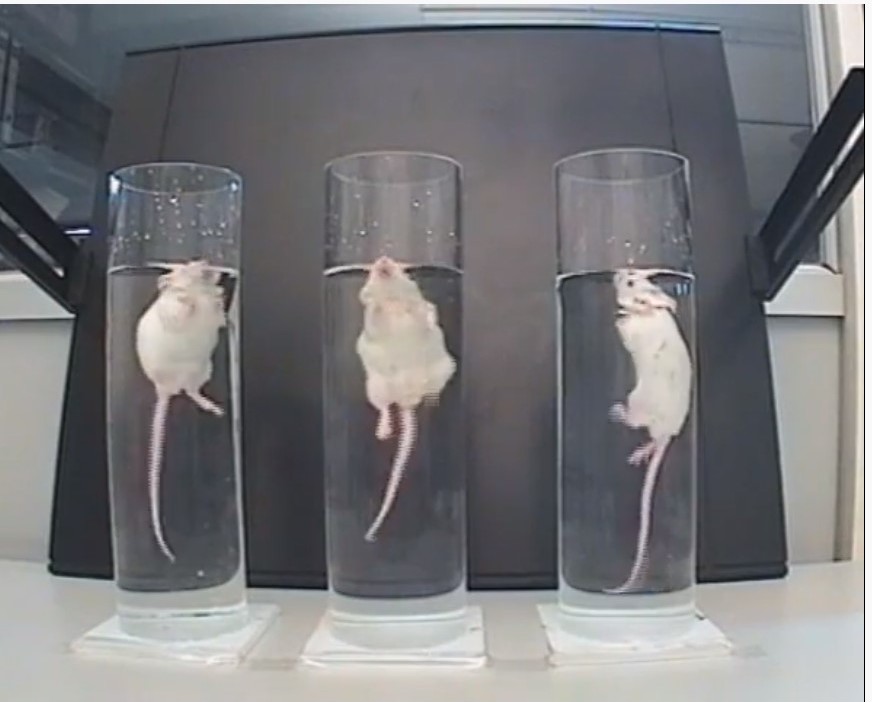Taiwan health authority officially scraps contentious animal experiments
On April 15, the Ministry of Health and Welfare formally announced it will abolish the cruel 'forced swim' and 'treadmill fatigue' animal tests from its health food certification scheme.
The controversial experiments are known to be among the most tormenting forms of animal testing and were previously authorized by the scheme to substantiate the anti-fatigue effects of food products seeking health food certification.

Image: Smart FST / YouTube
In the forced swim test, four groups of eight rats or mice are placed one-by-one into a container of water so deep that they cannot reach the bottom. According to the official testing methods published by the Ministry, the rodents should struggle to keep above water "until they are utterly exhausted and drown." To shorten the time taken to complete the test, researchers sometimes even attach lead wires to the backs of the animals to increase their weight.
In the treadmill fatigue test, rats are placed on treadmills fitted with electric shocks at the end of the treadmill belt. Researchers gradually increase the speed and incline of the treadmill until the rats fall into the shock zone. The official methods state that the rats "are judged to be fully exhausted when they fall into the shock zone multiple times and are unable to climb back onto the machine."
The two panic-inducing experiments inflict unnecessary torment on animals, and violate the 3R principles of replacement, reduction, and refinement. All animals used in the tests face certain death, as their livers are removed for biochemical examination.
In February 2020, King's College London became the first university in the world to drop the widely-discredited forced swim test following discussions with animal rights organizations, with the University of Adelaide following suit shortly after. Pharmaceutical companies including Pfizer, Johnson & Johnson and AstraZeneca have also banned the test.
Some members of Taiwan's scientific community have refused to disown the cruel experiments. In October last year, Chair of the Infectious Diseases Society of Taiwan Dr Huang Li-min stated that the tests "are mainly aimed at monitoring motor ability and physical energy expenditure."
"If the rats are not forced to perform the experiments, it will be hard for researchers to conduct research. They should not be banned in response to these calls [from animal protection groups]."
However, the scientifically-flawed forced swim and treadmill fatigue tests have been widely criticized as poor experimental design because they ignore the vast differences in human and animal physiology.
The new animal-free methods published by the Ministry are based on human trials and differentiated according to each product's anticipated effect on combatting fatigue, drawing on scientific techniques from exercise physiology. The updated methods are the gold standard for efficacy evaluations and do not require the use of cruel animal experiments.
"While there is much work to be done, we are delighted to see the Taiwanese authorities take another step towards a future free of unnecessary animal testing" said EAST researcher Hsin-Yi (Sally) Yao.
Campaign background
EAST has long called for the Ministry to abolish the panic-inducing tests from its health certification scheme.
In 2018, EAST partnered with legislator Lin Shu-Fen to expose the fact that less than 30% of claims made by certified health food products had been substantiated by human trials.
Last year, we again highlighted the scheme’s dependence on unnecessary animal testing and met with officials to push for amendments to the scheme, resulting in its adoption of the 3R principles, a tiered approach to testing methods, and the use of OECD Guidelines for safety evaluations.
In 2020, EAST was awarded the LUSH Prize for Lobbying for our work to erase mandatory animal testing requirements and prioritize non-animal testing methods in Taiwan’s chemical registration process.
Media contact
Hsin-Yi (Sally) Yao, Researcher
Environment & Animal Society of Taiwan (EAST)
Mobile: +886 (9) 3559 6996
Phone: +886 (2) 2236 9735










